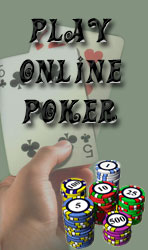Pokerwiner.com → Lessons of poker
REVERSE IMPLIED ODDS
Implied odds explain situations when your odds are better than they seem. There are other times when you must realize that your odds are not as good as they seem.
These situations occur when you have a mediocre hand with little chance of improving, which you think is the best hand at the moment, yet your opponent keeps betting.
You think he may be bluffing, and you can beat only a bluff – that is, a hand that is weaker than what your opponent is representing.
However, since your opponent is controlling the betting, he will probably back off on later rounds if he doesn’t have you beat.
Thus, you are in the position of winning the minimum if you have the best hand but losing the maximum if you have the worst hand.
The true pot odds in such situations are much worse than they seem, and so we call them reverse implied odds.
For instance, there is $50 in the pot, and your opponent bets $20. You think you have him beat, but you are not sure. You also have little chance of improving.
You cannot say, “I’m getting 70-to-20 odds here,” because your opponent may come out betting again next round if he has a better hand than yours – or if his hand improves to a better hand but he is likely to give it up if he has a worse hand than yours.
You are in a situation where, if you lose, you figure to lose not just the $20 you are calling right now but a total of $60.
However, if you win, you’ll probably win only the $70 in the pot right now because once your opponent sees you’re committed to the pot, he won’t bet further with the worst hand.
All of a sudden, then, you’re not getting 70-to-20 odds but closer to 70-to-60.
Actually, reverse implied odds of 70-to-60 represent the worst possible case of such situations, as they come up in practice.
If, for instance, you are sure your opponent will not bet again without a good hand, then you should obviously fold if he does bet again.
So you have risked only $20 and not $60 to win $70. Conversely, if there is some chance your opponent will bet once or twice more without the best hand, then when you continue calling, you are risking $40 to win $90 or $60 to win $110, depending on how many times he bets.
You are risking $60 to win $70 only when you plan t call to the end if your opponent bets, even though you assume you have little chance of winning if he continues betting.
Summary
In sum, reverse implied odds describe situations in which:
1. You’re not sure where you’re at.
2. You have little chance of improving to beat the hand your opponent might already have or might make.
3. A call commits you to calling future bets all the way to the end.
4. Your opponent can back off at any time.
In such cases, you must not think you are getting odds according to what’s in the pot and what you have to call right now.
You are getting much worse odds – so much worse that it is often better to throw your hand away immediately rather than get committed. Such a situation would occur in holdem if you held


and the flop came



A similar situation might occur in seven card stud if you held two black aces and an opponent with three hearts on board came out betting on fifth street.
Whereas implied odds are based on the possibility of winning more money in later betting rounds, reverse implied odds are based on the possibility of losing more money in later betting rounds.
Put another way, when you’re getting implied odds, you’re glad you’re not all-in, for you expect to make money on future bets if your card hits.
However, when you’re getting reverse implied odds, you wish you were all-in so you could see the hand to the end without having to call future bets.



